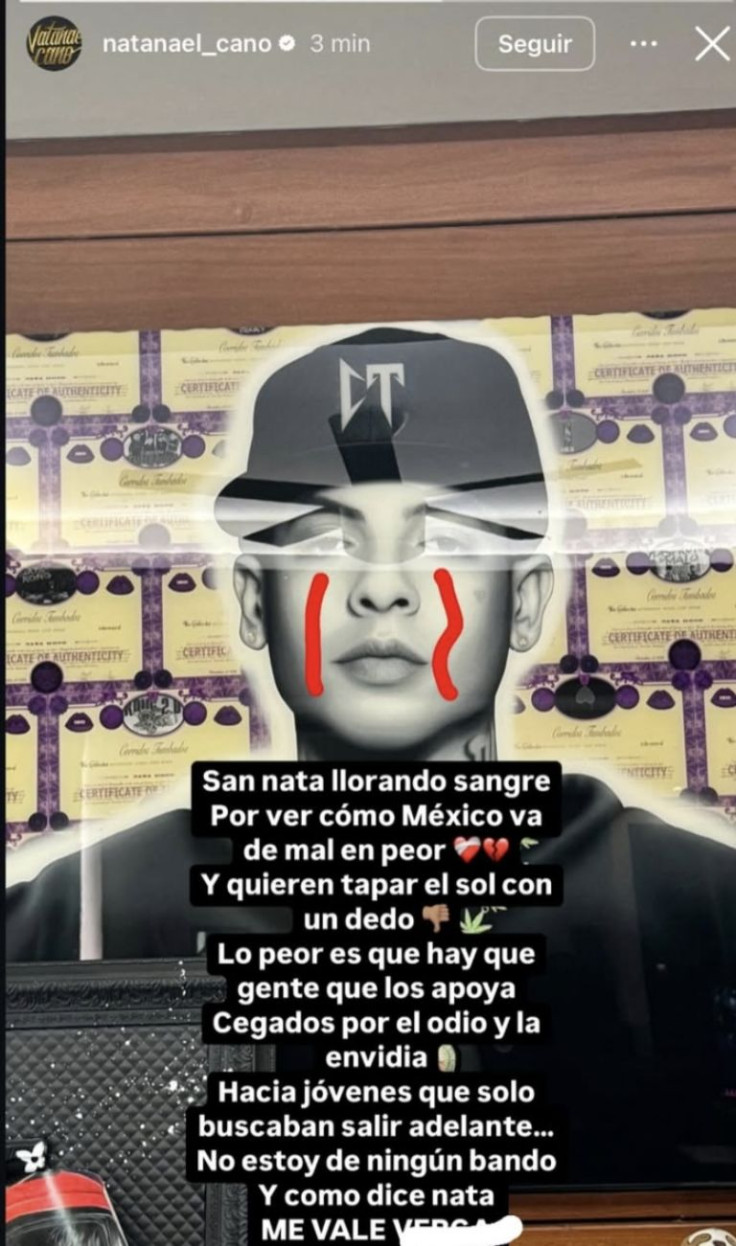Mexican singer Natanael Cano, considered a pioneer of corridos tumbados, is making headlines after posting a dramatic photo of himself appearing to cry blood on his Instagram story. The striking image was shared as a protest against newly enforced laws in several Mexican states that prohibit music glorifying criminal groups or illicit activity—a move that has drawn criticism and applause in equal measure.
“Saint Nata crying blood, watching how Mexico goes from bad to worse, and they try to block out the sun with one finger,” Cano wrote in his post. “The worst part is that there are people who support this, blinded by hate and envy.”
The post came amid a wave of government sanctions targeting narcocorridos, a controversial subgenre of regional Mexican music known for its lyrics about drug trafficking, cartels, and criminal figures. Recently, these songs have drawn sharp scrutiny from both Mexican and U.S. authorities, who view them as a form of glorification of organized crime.

Cano isn’t the only artist feeling the heat.
This past weekend, Grupo Firme, one of the most popular acts in regional Mexican music, refused to perform any narcocorridos during their headlining set at the Feria de San Marcos, despite audience demands. “We’ll stay as long as you want,” said frontman Eduin Caz, “but the rules are the rules, and we have to follow them. Sorry.” The crowd’s disappointment was palpable, especially after fans requested “Se Fue la Pantera,” a known narco ballad.
Fellow artist Luis R. Conríquez faced an even more hostile reaction. During his performance at the Feria del Caballo in Texcoco, Conríquez’s refusal to perform narcocorridos led to an outbreak of violence. Angry fans destroyed part of the stage and threw objects, escalating into a full-blown brawl.
The backlash against narcocorridos intensified after the group Los Alegres del Barranco displayed an image of Nemesio Oseguera Cervantes—better known as “El Mencho,” leader of the Jalisco New Generation Cartel—during a show. That performance not only sparked a criminal investigation in Jalisco for promoting criminal activity but also led to the U.S. revoking the band’s work visas, effectively banning them from touring stateside.
Despite the controversies, artists like Los Alegres del Barranco continue to dominate streaming platforms. Their recent single surged to the top of Spotify Mexico’s charts—evidence that, for now, fan demand remains strong.
Yet the pressure is mounting. As the legal and political climate tightens around this genre, artists are being forced to make difficult decisions: adapt their material, risk sanctions, or speak out. For Natanael Cano, the choice is clear—he’ll cry blood before he stays silent.
Whether the bans will succeed in curbing the influence of narcocorridos or only deepen their allure remains to be seen. But one thing is certain: the battle over this music is far from over.
© 2025 Latin Times. All rights reserved. Do not reproduce without permission.


